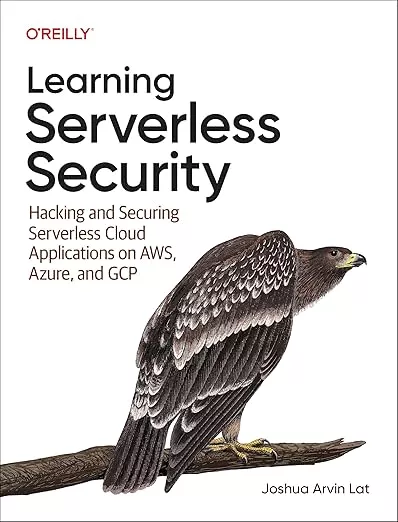We have all experienced the struggle of debugging code that just won’t work. It’s already 2 AM in the morning and you’re pulling out all the stops, searching Stack Overflow for answers, copying and pasting code and hoping for that miracle that it will work. (It feels too real that it hurts to read)
Now imagine instead, you simply tell your computer “Hi, this function isn’t working the way I want it to. Can you figure it out and fix it?” After a few seconds, ting! It actually does it, edits the codebase that you have and furthermore explains what was broken exactly and writes tests to make sure it won’t happen again.
Sounds too good to be true, right? Well, it isn’t because this is happening right now, and it’s possible because of Agentic IDE.
We are currently living in an era where we are not just getting better text editors; we are getting AI partners that actually think alongside us, understand our messy code and help us build things that we never thought possible.
Let me take you on a journey through what I like to call the “Agentic IDE Revolution” and trust me, once you see what’s happening, you’ll never look at coding the same way again.
What is “Agentic IDE” Anyway?
In case you are still unfamiliar with Agentic IDE, here is the gist of it. You know how your current code editor might autocomplete your variables or highlight syntax errors? That’s like having a really good spell-checker for code. An agentic IDE is like having a brilliant coding buddy sitting next to you who actually understands what you’re trying to build.
The word “agentic” comes from “agent” as these tools can actually take action on their own. They don’t just sit there waiting for you to ask for help. They actively participate in the coding process, almost like having a developer working alongside you 24/7.
Meet the Game-Changers
These are the tools that are literally changing how we code. I’ve been playing with these, and honestly, it feels like cheating (in the best way possible).
Github Copilot
The first time I’ve experienced agentic AI is first through the Github Copilot extension in VS Code. In February 2025, GitHub announced agent mode for Copilot in VS Code, introducing agentic capabilities for implementing changes across multiple files. At first, I was skeptical because what if it makes unnecessary changes to my code? But the more I tried it, the more I could see the appeal of this new way of coding.
Windsurf
It was one of the first true agentic IDEs I got my hands on, released by Codeium in 2024. What blew my mind is how it actually understands your entire project before making suggestions. Not just suggest changes, but actually implement them. I’ve watched it debug code, run tests, and fix issues all on its own. Codeium positioned this as their flagship agentic IDE, designed to collaborate like a Copilot and tackle complex tasks independently like an agent.
Cursor
Anysphere founded Cursor in 2022, with the first version released in March 2023. This IDE has been the talk of the town recently. It has been making waves because it just makes everything faster and smoother for team collaboration. What I appreciate about Cursor is how seamlessly it fits into your existing workflow as you don’t have to learn a completely new way of working. Key features like inline command and chat were released in late 2023, enabling users to interact with their code using natural language.
Amazon Kiro
This new IDE just dropped and it’s pretty wild. Instead of the usual “type some code and hope it works” approach, Kiro makes you start with a proper plan.¹ It won’t let you do “vibe coding”—that chaotic process where you just start coding without really thinking things through. You tell it what you want to build, it helps you create a detailed specification, and then it builds it properly with tests and documentation. AWS positioned this as solving the problem of production-ready code requirements that many AI coding tools struggle with.
Why This Changes Everything
It’s like having a coding mentor 24/7. Remember when you were learning to code and you had those moments where you just stared at the screen, not knowing what to do next? These tools eliminate that. They’re like having a patient tutor who can explain concepts and catch your mistakes before they become problems.
You can focus on the fun stuff. The tedious parts of coding like setting up boilerplate, writing repetitive functions or debugging syntax errors, these tools handle that automatically. This means you get to spend more time on the creative, problem-solving parts that made you fall in love with coding in the first place.
It’s not just about writing code anymore. These tools help with everything: writing tests, creating documentation, and even helping with deployment. It’s like having a full development team on your computer.
How This Is Changing the Game
For beginners: The learning curve just got gentler. These tools can explain complex concepts in layman’s terms and help you avoid common mistakes. It can teach you the basics of a certain concept and help you guide along the process of creating it. It’s like having a patient teacher who never judges you for asking questions.
For experienced developers: A common misunderstanding is that these agentic IDEs make it easy and we lose our skills and expertise in programming. But on the contrary, these tools (as they are) help us amplify it. Developers can now tackle bigger projects, experiment with new technologies faster, and spend more time on architecture rather than manually writing each line of code.
For teams: In collaboration it also helps in making the process much smoother and faster. Code reviews become more meaningful, onboarding becomes faster, and maintaining consistency across projects becomes almost automatic.
The Real Talk in Agentic IDE
Let me be honest, this isn’t all sunshine and rainbows. You need to learn how to work with these AI partners effectively. It’s a new skill called “prompt engineering”—basically learning how to communicate clearly with AI. The good news is, it makes you a better communicator overall.
In addition, these tools are incredibly powerful, but they’re not magic. You still need to understand programming concepts, architecture, and problem-solving. Think of them as really smart tools, not replacements for your own thinking process.
New tools are also popping up constantly, and existing ones are evolving rapidly. It can feel overwhelming trying to keep up. My advice? Pick one that feels right for your workflow, or choose among the IDE’s that is mentioned earlier and get comfortable with it before jumping to the next one.
What Developers Are Discovering
As more programmers adopt these agentic tools, common patterns are emerging in how they transform the development experience:
They elevate programming skills across the board. These tools don’t replace developer knowledge, they force clearer thinking about project requirements and architecture. When you need to communicate ideas to an AI partner, it naturally improves how developers organize their thoughts and approach problem-solving.As they say, being able to articulate exactly what you need to build is already half the battle won.
The creative aspects of coding shine. When the tedious stuff is handled automatically, you get to spend more time on interesting problems. The groundwork gets handled automatically, freeing up mental energy for innovation.
The barrier between idea and implementation is taken down. Teams are reporting faster prototyping cycles, more experimental approaches to problem-solving, and greater willingness to tackle ambitious projects. They’ve removed the friction that stood between having an idea and seeing it come to life.
Will AI Replace Developers? The Real Answer
Now, I know what some of you might be thinking: “Wait, are these AI tools going to replace me?” Look, I get it, I had the same worry when I first heard about all this stuff. But here’s the thing: these are just tools, really powerful ones, but still just tools.
Think about it this way: calculators didn’t put mathematicians out of business, and spell-check didn’t eliminate writers. These agentic IDEs won’t replace programmers either. They just make us way more capable at what we do.
The developers who are going to thrive in this new world aren’t the ones who can memorize every syntax rule or write the fastest loops. They’re the ones who can think through problems, come up with creative solutions, and know how to work with their AI partners effectively. All that strategic thinking, the “aha!” moments, the ability to see the big picture, that’s still 100% human.
 The Future is Just Getting Started
The Future is Just Getting Started
Here’s how I see it: we get to choose how this plays out. AI is already changing programming whether we like it or not. But we can either fight it and get left behind, or we can embrace these tools and use them to build amazing things we never could have tackled before.
But here’s what excites me most: we’re still at the very beginning. The tools I’ve described are just the first generation. Imagine what coding will look like in five years when these systems get even smarter and more capable, not to replace us, but to help us build things we can barely imagine today.
Welcome to the future of programming, where we truly can code at the speed of thought.
References
- Amazon Web Services. (2025). “Enabling customers to deliver production-ready AI agents at scale.” https://aws.amazon.com/blogs/machine-learning/enabling-customers-to-deliver-production-ready-ai-agents-at-scale/
- Codeium/Windsurf Team. (2024, November). “Windsurf Launch – Built to keep you in flow state.” Windsurf Blog. https://windsurf.com/blog/windsurf-launch
- Anysphere Team. (2024, August). “Series A and Magic.” Cursor Blog. https://cursor.com/en/blog/series-
- GitHub. (2025, February). “GitHub Copilot Workspace: Welcome to the Copilot-native developer environment.” GitHub Blog. https://github.blog/news-insights/product-news/github-copilot-workspace/
- Maginative. (2024, November). “Codeium launches Windsurf Editor, an Agentic Integrated Development Environment.” https://www.maginative.com/article/codeium-launches-windsurf-editor-an-agentic-integrated-development-environment/
- GeekWire. (2025, January). “Amazon targets vibe-coding chaos with new ‘Kiro’ AI software development tool.” https://www.geekwire.com/2025/amazon-targets-vibe-coding-chaos-with-new-kiro-ai-software-development-tool/

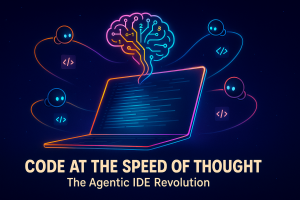

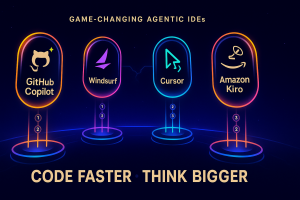
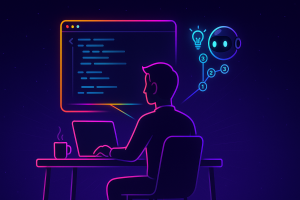
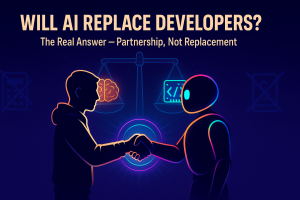 The Future is Just Getting Started
The Future is Just Getting Started





